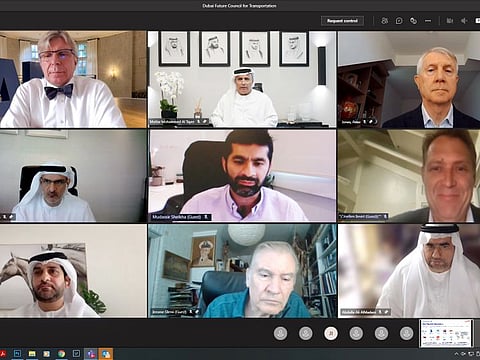Video: 55% of Dubai population to live within 800m of metro stations
Dubai among fastest cities in regaining public transport ridership to pre-COVID-19 levels

Also In This Package
Dubai: Dubai plans to concentrate 55 per cent of the population within 800 metres from the metro stations as per its Urban Plan 2040, Mattar Mohammed Al Tayer, Director-General, Chairman of the Board of Executive Directors of the Roads and Transport Authority (RTA), said on Sunday.
He added that decisions taken by the Dubai Government since the outbreak of the COVID-19 pandemic last year contributed considerably to containing the impacts of the pandemic on vital sectors, especially the transportation sector. “Such decisions also facilitated the speedy recovery and restoration of normal life in the city. Information released by the International Association for Public Transport (UITP) indicated that Dubai was among the world’s fastest cities in regaining public transport ridership to pre-COVID-19 levels,” commented Al Tayer.
Al Tayer made these remarks while chairing the 6th meeting of the Dubai Future Council for Transportation held remotely in the presence of members including CEOs, academia and international transportation experts.
The meeting screened several topics that included the successful practices of tackling the COVID-19 and mitigating their impacts on transportation, a vital sector and key driver of economies. The council also reviewed the accelerators of quality living from a transportation perspective.
District Link
“The vision of the Dubai Urban Plan 2040, launched by His Highness Sheikh Mohammed bin Rashid Al Maktoum, Vice-President, Prime Minister of the UAE, Ruler of Dubai, last March, aims to rank Dubai the best city for living in the world. Such a drive requires sustained improvements of public transit means to make mobility easier across the city. Among the key pillars of the plan is to concentrate 55 per cent of the population within 800 metres from the metro stations and enhancing district links by constructing cycling tracks. RTA intends to expand the total length of cycling lanes to 668km by 2025 to turn Dubai into a bicycle-friendly city. Among the pillars is to expand the greenery of the city as it will reduce the impact of urban heat islands and provide shaded tracks for pedestrians and cyclists,” explained Al Tayer.
The Council reviewed the progress in the improvement of infrastructure and futuristic transit means. RTA plans to develop flexible and shared mobility means to ease the first and last-mile challenge, besides examining global experiments for benefiting from the infrastructure in a better way depending on need and the traffic volumes. In this regard, the Council reviewed the trial run of the e-scooter in five districts of Dubai in coordination with the Dubai Police.
The council looked into several new practices rolled out by some cities such as transforming the right-of-way from lanes serving vehicles only to lanes that also serve flexible and shared transport. Topics discussed also included the classification of roads according to their purpose, and partnership-based contracts.
Sign up for the Daily Briefing
Get the latest news and updates straight to your inbox









